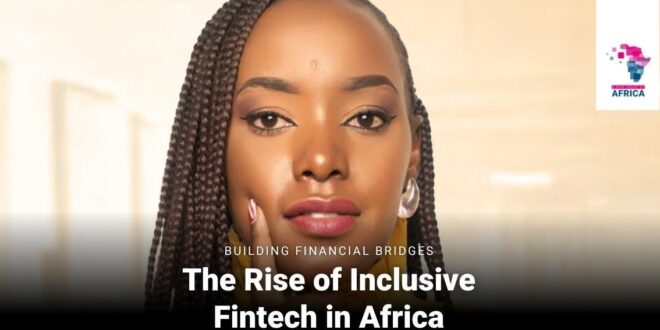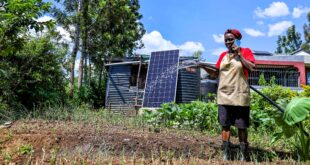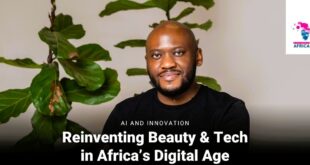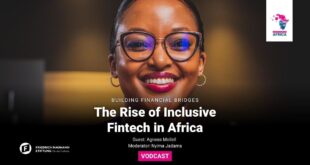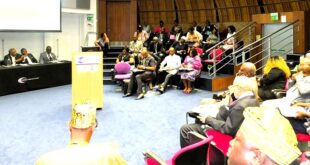The Friedrich Naumann Foundation for Freedom (FNF), in partnership with Nyima’s Bantaba Media Platform, is spotlighting changemakers who are transforming narratives and reshaping Africa’s future. As part of a series of interview publications (VOD & Podcast), Nyima’s Bantaba Media Platform profiles four innovators across East and Southern Africa who are not only talking about change but building it from the ground up.
![]()
In this edition, Nyima Jadama speaks with one of Kenya’s leading fintech innovators breaking barriers across the continent: Beth Wambui Mwangi, founder and CEO of MyWagePay Ltd, a company on a mission to drive financial wellness and economic empowerment across Africa.
A recognised leader, she was named among the Top 10 in the Westerwelle Foundation’s Young Founders Programme (2022). Under her leadership, MyWagePay secured a Digital Credit Provider Licence and raised €450,000 in debt investments. She has built an online community of over 1.2 million and leads a team of 11.
On transforming narratives for Africa and what the new image of Africa means, Beth said:
“The new image of Africa to me is about shifting the narrative from dependency to a narrative of possibility and innovation.”
Here are excerpts from the exclusive interview:
What inspired you to launch MyWagePay, and what problems were you trying to solve?
We created MyWagePay after realising that, according to our 2020 report, there are 44 million SMEs in Africa that contribute 90% of jobs and 80% of businesses. However, 65% of these businesses do not survive beyond three years due to a lack of capital. When they turn to traditional banks, these banks often prefer companies with substantial assets and strong financial histories.
As a result, many SMEs resort to private lenders who charge extremely high interest rates — sometimes as high as 400% APR. That’s why we developed MyWagePay, a platform that provides instant, affordable financing to these businesses.
The African Fintech Space is Growing Rapidly. What Makes MyWagePay Stand Out?
In Kenya and across Africa, mobile money is widely used. We operate as mobile lenders within the digital space. What makes us stand out is that we not only provide finance but also offer an embedded platform. Through embedded finance, our customers can integrate directly into our system — they don’t need a separate app for every product.
We use alternative data to credit-score our customers, supported by our own internal credit scoring model. Unlike traditional banks that rely on collateral such as land or vehicles, we assess factors like mobile transaction history and cash flow patterns over several years. This innovative approach has enabled us to achieve a 96% collection rate.
We also provide working capital to businesses within our ecosystem, which further strengthens their growth. That’s a key advantage for us.
Your company has built a community of over 1.2 million people. How important is digital engagement in building trust in financial services today?
I would call that a social licence — what people say about you. Building an online community demonstrates that people trust us. It shows credibility and loyalty. Customers know we do more than others, which fosters long-term engagement.
Through online interactions, we receive instant feedback and create direct touchpoints for communication. This enables us to continually improve our user and customer experience — something that has been invaluable to our success.
What challenges did you face, and how did you overcome them?
One major challenge was access to capital. When we started, banks required collateral, but I didn’t own land or a car, so I couldn’t access loans. During my master’s programme, I partnered with co-founders who were second-time founders, and they helped raise our first round of funding. This allowed us to test and refine our product until it reached market fit.
Now, we’re looking to build a digital bank. We plan to collaborate with payment gateways and service providers such as Safaripal, Visa, and Mastercard to offer affordable credit to underserved SMEs across Africa. If this vision is realised within the next five years, we will have established a full-fledged digital bank.
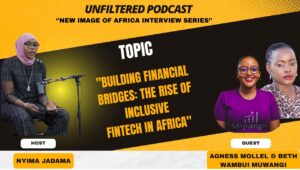
What does the new image of Africa mean to you, and how do you see the continent transforming through entrepreneurship and technology?
The new image of Africa is about possibility and innovation — an Africa that builds its own technology and relies less on aid. It’s an Africa where women can lead and thrive, where people are creating solutions rather than waiting to be saved.
For too long, Africa has been portrayed as unstable and dependent. That narrative no longer reflects reality. Today, Africa is driven by youth, women, technology and entrepreneurship.
For instance, M-Pesa, launched in 2007, now processes over 60% of Kenya’s GDP through mobile money transactions. Although around 70% of Kenyans still cannot access traditional banks, over 80% can access capital and manage finances through mobile money. This illustrates how technology is transforming financial inclusion.
Africa has also seen rapid entrepreneurial growth — with over 60% of the population under 25 and $6.5 billion in venture funding recorded in 2022. That’s a 101% shift in how the world should view Africa.
How are you empowering women aspiring to enter the fintech industry in Kenya?
Through mentorship. In 2022, I was appointed as an African Berlin Network Ambassador for ecosystems in Kenya and Berlin. We mentor aspiring fintech entrepreneurs and innovators across disruptive technology sectors.
Currently, we are supporting 1,000 women. We realised that some were engaging in exploitative practices such as exchanging sex for money or fish to survive. We aim to change that narrative by empowering women to start their own businesses.
We provide both funding and financial education, enabling women to plan, invest, save, and build emergency funds — contributing to the goals of zero hunger and poverty reduction.
What’s one myth about Africa, African women, or African innovation you’d like to debunk?
That Africans — especially African women — are simply waiting to be helped. In reality, we are at the forefront of innovation, creating solutions to the world’s most pressing challenges.
For instance, MyWagePay, founded in 2021 as a female-led organisation, has already disbursed US$6 billion through our platform. Across the continent, 26% of adult women are engaged in entrepreneurial activity.
Africa pioneered mobile money through M-Pesa, which now serves over 50 million customers. This is proof that African innovation is driving real, global change. We are not passive participants in the future — we are the authors of it.
What advice would you give to a young African woman with an idea or solution but unsure where to start?
I would advise her to join entrepreneurial development programmes such as the Westerwelle Foundation’s Young Founders Programme, which supports startups in Africa, Latin America, and Asia.
There are also excellent platforms in Kenya like SoteHub and the Women’s Global Forum, where I was among the Top 10 participants in 2023. These programmes help founders refine their ideas, achieve product–market fit, and connect with global investors.
For those unsure where to begin, go online, research opportunities and reach out to people within the ecosystem. You’ll eventually find the right network to support your journey.
![]()
Watch the interview on Youtube HERE
For more information about the project and the broadcast publication, visit: https://www.freiheit.org/de/subsahara-afrika/focus/ein-neues-bild-von-afrika
 THE AFRICAN COURIER. Reporting Africa and its Diaspora! The African Courier is an international magazine published in Germany to report on Africa and the Diaspora African experience. The first issue of the bimonthly magazine appeared on the newsstands on 15 February 1998. The African Courier is a communication forum for European-African political, economic and cultural exchanges, and a voice for Africa in Europe.
THE AFRICAN COURIER. Reporting Africa and its Diaspora! The African Courier is an international magazine published in Germany to report on Africa and the Diaspora African experience. The first issue of the bimonthly magazine appeared on the newsstands on 15 February 1998. The African Courier is a communication forum for European-African political, economic and cultural exchanges, and a voice for Africa in Europe.

